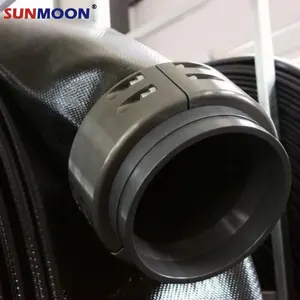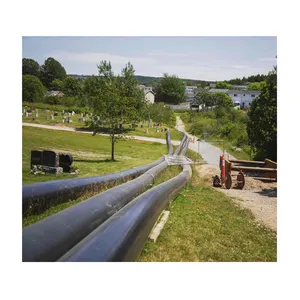
Hdpe Agriculture Irrigation Polyethylene Black Tube Blue Line Plastic 2 3 4 Inch Water Poly Pipe Roll

Irrigation Pipe SUNMOON Heavy Duty High Pressure 200 Psi 12 Or 10 Inch Tpu Lay Flat Hose Irrigation Pipe






















Poly pipes, short for polyethylene pipes, is a popular choice for various plumbing, irrigation, and industrial applications. Composed of polyethylene, a durable and flexible material, these pipes offer numerous benefits. They are suitable for various uses, making them a versatile and reliable option in fluid transport systems.
One of the key benefits of poly pipes is their exceptional durability. Constructed from high-density polyethylene (HDPE) or low-density polyethylene (LDPE), these polyethylene pipes are resistant to corrosion, chemicals, and abrasion, ensuring longevity in diverse operating environments. The robust nature of poly pipes makes them an ideal solution for applications requiring dependable and long-lasting fluid conveyance systems. Furthermore, poly pipes are lightweight and flexible, facilitating ease of installation and handling. The inherent flexibility of these pipes allows for straightforward maneuverability around obstacles and terrain variations, reducing the need for complex and costly fittings or connectors. This flexibility streamlines the installation process, making poly pipes a practical choice for both professionals and DIY enthusiasts.
In addition to their durability and flexibility, high-density polyethylene pipes offer excellent resistance to impact and external stresses. This is particularly valuable in applications where the pipes are exposed to harsh environmental conditions or potential physical pressure. The ability of poly pipes to withstand impact and external forces contributes to their reliability and longevity in demanding operational settings. Moreover, poly pipes are known for their corrosion resistance, making them highly suitable for conveying a diverse range of fluids, including water, chemicals, and gases. This resistance to corrosion ensures the integrity of the pipe material over time. It minimizes the risk of degradation, contributing to the overall efficiency and safety of fluid transport systems.
Poly pipes find extensive applications across various industries, including agriculture, landscaping, plumbing, and wastewater management. In agricultural settings, these pipes are commonly utilized for irrigation systems, delivering water efficiently to crops and fields. The flexibility and durability of irrigation poly pipes can adapt to the contours of the landscape and withstand environmental elements. Furthermore, poly pipes are widely employed in plumbing systems for residential, commercial, and industrial purposes. Their versatility and reliability make them an indispensable component in water supply networks, sewage conveyance, and drainage systems. The lightweight nature of polyethylene pipes for water supply facilitates ease of handling during installation and maintenance, contributing to enhanced efficiency in plumbing applications. In addition, poly pipes play a crucial role in the mining industry, where they are utilized for slurry transport, dewatering, and other fluid handling requirements. The robust construction of these pipes enables them to withstand the demanding conditions prevalent in mining operations, contributing to the reliable and efficient conveyance of fluids within mining facilities.
Furthermore, sprinkler poly pipes are extensively used in landscaping and horticulture for the distribution of water and the establishment of efficient sprinkler systems. The flexibility and resistance to environmental factors make poly pipes for sprinkler systems well-suited for creating customized irrigation networks in parks, gardens, and green spaces, promoting water conservation and sustainable landscaping practices. Additionally, poly pipes are employed in the construction of underground utilities, such as gas distribution and telecommunications conduit systems. Their durability, corrosion resistance, and flexibility make gas poly pipes an ideal choice for ensuring the reliable and safe conveyance of essential utilities beneath the ground, contributing to the robustness and longevity of utility infrastructure.